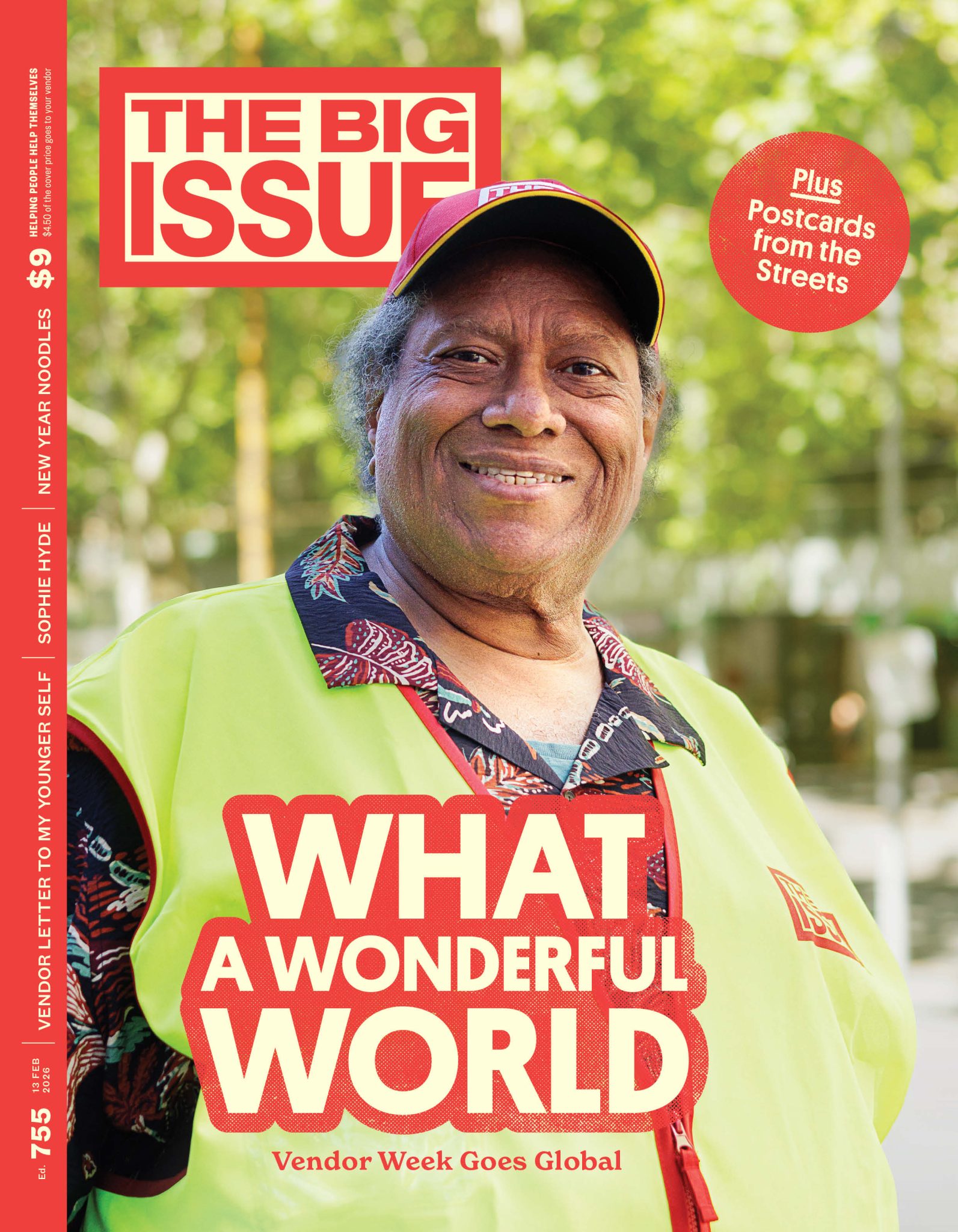Her Excellency the Honourable Sam Mostyn reveals the “single most important question” she had to answer before swearing in as the 28th Governor-General of Australia.
My sisters describe me as being born 30. I’m the oldest of four girls. I was a good kid. I was quite serious, with a deep interest in the arts and creativity. I was very sporty growing up, playing lots of sports: tennis, swimming, netball, basketball, and then rowing at university.
I have very vivid memories of moving and changing schools. When we were very little, my dad was in Vietnam for a year, and my mum moved us to live with my grandmother – starting school in Adelaide, doing some of my schooling in Melbourne, before [settling in] Canberra. I think I thrived on it, because I learned to deal with change, and moving, and making new friends.
Nowadays, you wouldn’t let young kids go doorknocking, but that’s what we would do. As kids, we were doorknocking for the Salvos and the Heart Foundation. Mum and Dad were always on the committee for the fetes, for the schools, everything to do with fundraising. I never thought to call it service, it was just being part of the community.
In November 1975, I’d broken my ankle playing elastics in the backyard. I’d just turned 10 in September. My mum dropped me off at Woden Valley Hospital, and I was about to have my ankle plastered – and I just remember on the television screens, suddenly, was live coverage of this event happening over in the Parliamentary Triangle. I have this vivid memory of lying there, the white plasters going on, and watching [Prime Minister Gough Whitlam’s dismissal by Governor-General Sir John Kerr], probably not understanding it fully. Adults all stopped: patients, doctors, nurses. It was a big event, and when I got home, of course, my dad and mum were watching it on the ABC News.
At 16, I would have been studying quite hard. I was at Narrabundah College in Canberra, in the very fortunate position of having Year 11 and 12 in a college environment like a mini university: no uniforms, having to build my own schedule around the subjects I’d chosen. This was a really thrilling educational experience of being trusted as a young person to build your curriculum. It was a really great group of people, and I had my first major boyfriend at that time. That was lovely.
[Studying law] was probably one of the luckiest fluke decisions I ever made. The school counsellor looked at my grades and said, “Look, you’ve done equally well in the arts and sciences, but you’re not strong enough in maths and science to get into medicine. My advice for you is to apply for dentistry or law.” I found myself at ANU law school first year, loving it. I dyed my hair, wore overalls, I got active. I moved out early, and I lived in group houses.
I’ll never forget a conversation I had with my dad about my feelings as a university student, trying to understand why my dad had served in the Vietnam War. I was finding my own activism and engagement with the world. He was an Army officer, his career was defined by a command structure, and that’s what he explained to me. He said, “I think you need to learn to meet people where they’re at. Always meet people with respect. Don’t jump to a conclusion about anyone, and never critique someone you’ve never met.”
I got a deep sense of commitment to family from my mother. She was highly educated; she’d been a librarian before she met my dad. She was always interested in health and nutrition: for a while we were vegetarians, and she joined the Natural Health Society. She started making essential oil creams in the Kenwood mixer in the kitchen. We would sit at home at night and help write the labels on little brown bottles and tubes. She registered a small business and it grew quite quickly. We were watching my mum pushing herself and doing these things around the kitchen table.
The biggest success of my life is having a long-term happy partnership with my husband [Simeon Beckett], and having been part of raising a 25-year-old daughter [Lotte], who continues to fill us with such extraordinary love and hope. She teaches us about the world. I was lucky to meet the right person at the right time, who got me and I got him. We met in our mid-thirties, and we knew. So my fundamentals are sound and stable, and full of happiness and love. That’s the thing I’m most proud of, because everything else I do relies heavily on all of that.
I’d tell my younger self to just listen a bit more, rather than always waiting to talk. At work, I was with an Aboriginal woman who watched me, and she said, “You just need to understand the difference between deep listening and waiting to talk.” It took me until I was in my late twenties to realise that my entire growing up had been through a system and a way of telling us our history that had excluded First Nations people. I would say to my younger self: do some deep listening and understanding, rather than always thinking you’ve got the answer.
To everyone who’s miserable in their jobs: sometimes you just have to quit it for the opportunity. I chose not to be a barrister. After working for Justice Kirby in the NSW Court of Appeal, where it was rare to see women appearing in the court, I decided to be a solicitor. I only did that for a few years and did not find it fulfilling. I told my boss, “I’m resigning, I don’t want to wait until I become such a bad lawyer you have to get rid of me.” It was terrifying because I didn’t have a job to go to, and I didn’t know how to pay my rent – but it’s been one of the fortunate things in my life. Suddenly other doors opened: I was able to spend a lot of time in the commercial, private and not-for-profit sectors, and we did really big things like workplace reform on parental leave.
I can’t overstate what being the first woman commissioner at the AFL meant: it was profound. Arriving at the Commission was a big and deeply personal moment in my life in 2005. Suddenly sitting around the table of the most successful professional sporting code in the country, that then led to being involved with the creation of AFLW. That taught me where sport fits in our culture, why it matters. I stood on the shoulders of a community of women who have been advocating to be respected in the game for, in some cases, half a century.
The Prime Minister rang me and asked me if I would meet him at Kirribilli House. I’d known the Prime Minister, but not as a friend. I’ve never had a beer with him, or been to a footy game, but we had worked together. I’ve never been a member of a political party. After I arrived at Kirribilli House where he was alone with Toto, his dog, he shocked me with the question as to whether I’d be prepared to serve as Governor-General. It was a complete surprise, and something I’d never considered; in some ways it seemed preposterous. I said, “I just have to talk to Simeon and Lotte.” Lotte was the smartest: she said, “I want you to be happy. So will you be happy in this job?” It was the single most important question that anyone asked me through the whole process.
In saying yes, I had to think very deeply. I travelled to meet all of the former living Governors-General before I was sworn in, and they each gave me incredible wisdom and insights. They are all exceptional, good Australians. Sir William Dean summed it up: the Governor-General should always show compassion. I read all the speeches: Sir Zelman Cowen said the job is to reflect the light and shade of the country back to the country, and always show up and always listen. They’ve all been clear about the fact that you do this with a great deal of privilege, but also with concern and care for the country.
I have a very positive and strong relationship with The King, just as all representatives of the Crown. Under our constitutional arrangements I exercise all the powers of the Crown in Australia through the Office of Governor-General. The King would never seek to advise me on how I do my job, and nor would I seek his guidance. The Governor-General has always taken their advice and counsel from the Australian Prime Minister and the Government of the day. It’s true that I enjoy my conversations and correspondence with The King, but that is all about his interest in us as a nation doing well and his curiosity about our role as a part of the Commonwealth. It’s a meaningful relationship but we both understand our constitutional arrangements.
This country is mighty for all sorts of reasons, and often we’re not telling the positive stories back to ourselves. We allow division to often prevail. I see many things that are challenging, but for the most part, I see things happening across communities that tells the story of us at our very best. And that’s what I hope this office will always do: bring attention to Australians at their very best and to play my role in the stability and continuity of our democracy. That’s why I care so much about Australians understanding our civics.

by Amy Hetherton, Editor
Published in ed#741
Want more of The Big Issue?
Subscribe to The Big Issue magazine to enjoy powerful journalism, stories from our vendors, and more — all delivered straight to your door.
Subscribe now.
